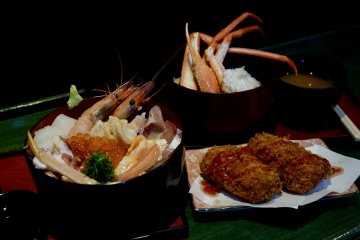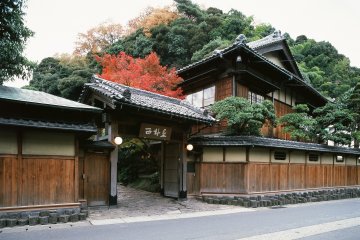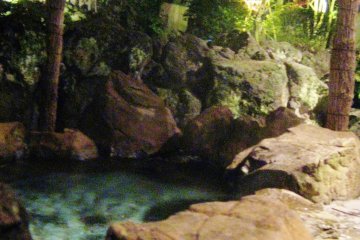A first look at Genbudo Cave can be quite startling. One of five look-alike basalt caves in Toyooka, Hyogo, curious asymmetrical columns are etched deeply into its walls, some uniformly striated and shaped, some not. Like waves of stone going in unexpected directions, it appears like a large and looming discordant piece of sculpture, and Nature is the sculptor.

Genbudo and its counterparts were formed by a volcanic eruption over 1.6 million years ago. When the lava cooled, it did not remain as a solid mass of rock, but contracted, rather sharply I imagine, forming vertical fissures. These evolved into the columnar joints seen today. Some appear suspended with no support, like defying gravity.

It’s quite eye scrunching to try to detect a pattern. Yet long ago priests and scholars must have looked long enough to make out the shape of mythical and legendary animals. For example, the sighting of a black tortoise, or Genbu, amidst the whirls and whorls of Genbudo Cave was what named Genbudo. The Japanese translation of basalt, to increase vitality and keep away evil spirits, has also been attributed to the Cave.
All the Caves are collectively named Genbudo, with Genbudo the main and most visited, Seiryūdō next. Seiryu Cave has an impressive cliff 33 meters high and 40 meters wide. Its reflection in the pond supposedly looks like a dragon.

Both are the most impressive and accessible. The others require some climbing up some nasty looking narrow mossy cobbled rocks. Warning signs will dampen any dream that we might make it.

Genbudo is more than gawk, gape, and gasp. Fascination with its dissonant patterns led to research trying to figure out how and why. A Japanese geophysicist, Motonori Matuyama, discovered in 1926 that it’s all about magnets or magnetic fields. Who knew? Apparently, basalt, Genbudo’s rock, had a different magnetic alignment from that of Earth. When cooling after an eruption, its peculiar magnetic qualities pulled it in the opposite direction or against the direction of Earth’s magnetic pull. To test out Matuyama’s theory, now proven, we are told to hold a compass at Genbudo and watch what happens.

The Cave's locale is in contrast to its jagged edges and topsy turvy carvings. It's very Toyooka, peaceful and tranquil, everything in place in perfect harmony.

Genbudo Museum at the entrance to the Caves has all the facts, with English speaking guides. It's of course useful to get to the core of this amazing piece of Nature's work, the reason for Genbudo's selection as one of the world's top 100 geological heritage sites. But standing before it, feeling awe at this silent, mysterious and majestic presence, somehow knowing it's just rocket science does take something away from Genbudo's powerful visual impact.












